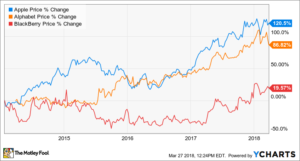It’s been a solid year of returns for major smartphone companies. Apple’s stock has advanced by more than 20% over the past 12 months — pushing it ever closer to becoming the first $1 trillion publicly traded company — while Alphabet and its premier hardware partner, Samsung, have seen similar returns over the time period. However, forgotten smartphone maker Blackberry (NYSE: BB) has soundly outperformed these stocks with an 82% gain.
Of course, it’s no longer accurate to think of Blackberry as a smartphone company. In fact, it’s Blackberry’s retreat from the smartphone market that has recently propelled the stock price higher. After saying in 2014 that he was “abnormal” for taking the CEO role — “Any normal exec or CEO would have probably said ‘I want a safer, easier job.’ ” — John Chen’s first move was to limit the cash Blackberry was hemorrhaging from its smartphone business by shifting away from its own operating system and then by limiting its handset lineup to focus on security-centric models.

It’s been a slow turnaround
A brief scan of Blackberry’s website shows where the company is going. Gone are the vanity shots of smartphones, replaced by information on security-focused services and Blackberry’s QNX operating system. Although the company still has three smartphones, the company has shifted its smartphone strategy from hardware to deriving value from providing digital security for non-Blackberry units. Chen built upon Blackberry’s reputation for security by making a series of security-focused mobile solutions including AtHoc, Good Technology, SecuSmart, and WatchDox.
It certainly hasn’t been a quick turnaround for Chen and Blackberry. Despite its strong one-year returns, shares significantly lag Apple’s and Alphabet’s over the past five years. Still, Chen should be commended for bringing the company back from the brink of failure while transitioning its focus.

For example, throughout the first nine months of fiscal year 2014 Blackberry (then Research in Motion) reported $3.4 billion in hardware sales with an additional $2.1 billion in service fees (the clear majority were smartphone-derived service access fees). Through the first nine months of fiscal year 2018, Blackberry recorded hardware sales of $62 million, a 98% decrease, and service access fee revenue of $102 million, respectively. While Blackberry’s lower revenue in hardware was mostly due to competitive forces, more recently this has been due to Chen’s pivot to enterprise software, services, and licensing. Those rose from an insignificant figure in 2014 to 84% of Blackberry’s total revenue haul in 2018.
Chen continues to cement his reputation as a turnaround specialist
Blackberry would not be the first time Chen’s faced long odds. In 1998, Chen took the reins of database management company Sybase when analysts at Gartner had assigned the company only a 30% chance of survival. Chen quickly returned the company to profitability and Sybase was sold to Germany’s SAP 12 years later for more than six times the value of when Chen took over.
While it’s too early to predict Blackberry will match Sybase’s success, it appears Chen’s vision is finally starting to take shape. Blackberry recently announced it will extend Chen’s contract until November 2023 as investors are becoming increasingly bullish on his vision.
Chen still has his work cut out for him. Revenue continues to drop on a year-over-year basis, although the shift to software changes the profit-margin profile. Additionally, the company still suffers from unreliable profitability, often due to below-the-line items not directly related to current operations, like a patent infringement payout to Nokia paid this quarter and fair value adjustments on debentures. That said, if you’re looking for a turnaround story with room to run, put Blackberry on your watchlist and watch Chen’s moves carefully.


